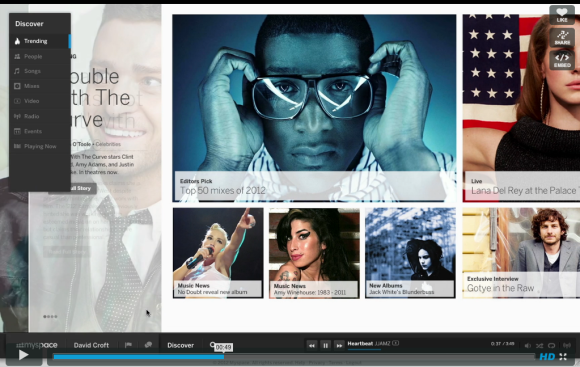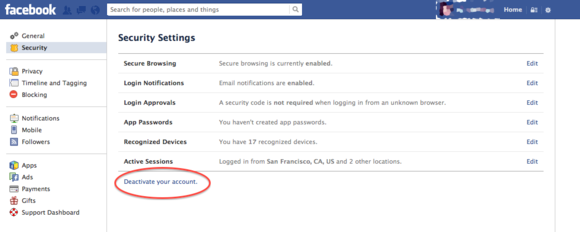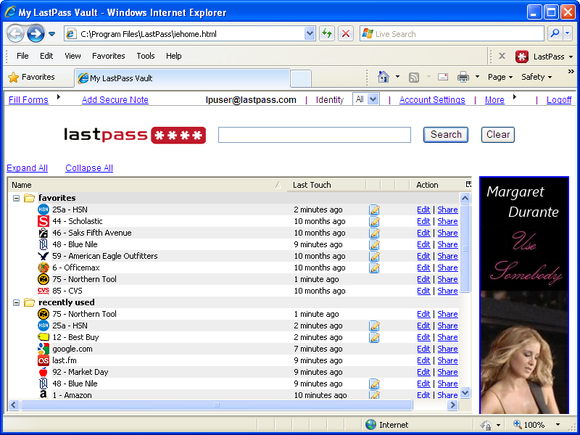Stop and consider how many different websites, social networks, and other online services you’ve joined over the years. For that matter, think of all of the software, mobile apps, browser plug-ins, and other things you’ve installed on your PC or mobile devices.
How many of them do you use on a regular basis? And how many of them still link to your Facebook or Twitter profiles? More important, how many of them do you actively manage and update to ensure that they’re properly protected?
Here are the dangers to watch for, plus a few tips for dealing with the user accounts that just won't die.
The undead: A major headache for the living
I haven’t used MySpace.com in ages; it has probably been at least five years since I’ve even logged in to the once-dominant social network. But as it turns out, I still have an active account there. I needed a couple tries to recall (or guess, really) my login email and password, but I got in.Once I logged in, I found information about where I lived and worked, and a few invitations to play online games from early 2009, as well as connections to friends and their personal information. I can all but guarantee that none of those friends has thought about MySpace in years, either.

Using the same password on multiple sites is a bad idea, though. Even online platforms that don’t have access to financial information or Social Security numbers can still reveal seemingly innocuous details, providing hackers with clues for breaking into your other accounts. My MySpace profile, for instance, contains personal details such as the name of my high school and my zodiac sign—providing hints about things that sites commonly use as authentication questions.
Wolfgang Kandek, CTO of security firm Qualys, learned the hard way that reusing passwords can backfire. Kandek says, “I used to use a common 'beater' password for these types of sites, but it recently came back to haunt me when my password at Stratfor leaked and in the subsequent inventory I found that I had used it for many sites that I have come to consider important.”
Kevin Haley, director of Symantec Security Response, warns that zombie accounts could get hacked, and that the data shared with those accounts could be stolen or exposed—but he also notes that the risk isn’t necessarily any greater than it is for the sites you actively use.
Keep in mind, however, that more-obscure sites and services don’t have the resources of Facebook or Google, and may not be as actively maintained and protected.
Deactivate or delete unused accounts and applications
If you’re not going to use a social network, app, or online service any longer, shut down your account. In many cases people simply walk away and stop using a tool or service, but leave it active and do nothing to remove or protect any information it has access to.Many sites and services don’t have a defined data-retention policy, so as far as you know the data you posted to your account could be retained indefinitely. A server breach or compromise years from now could expose information that you forgot you ever even shared.

Henry also stresses that unused applications and plug-ins are a bigger threat than the possibility of a forgotten website being hacked. Odds are good that you aren’t patching and updating software you aren’t even using. When attackers find vulnerabilities in those programs, they become an easy back door for compromising your PC.
Part of the problem is that people rarely make a conscious decision to pull the plug on a site or service. You might just stop visiting a site frequently, and eventually forget about it entirely. It takes a little work to stay on top of these things, but you should make the effort to ensure that you don’t expose yourself to undue risk or leave sensitive information vulnerable.
Use a password-management utility

Kandek learned his lesson after the Stratfor incident. It prompted him to change his behavior and start using a password manager to generate single-use passwords rather than reusing the same password over and over. “I have been very disciplined, and it has proven quite workable and useful. I use LastPass because they support Linux and Chromebooks well and offer two-factor authentication.”
Of course, an online service like LastPass is itself a risk, so it’s not exactly a silver bullet. There was some concern in 2011 that LastPass may have been breached, but that turned out to be an overreaction to anomalous network traffic.
Nevertheless, be sure to follow these tips and take steps to deactivate or delete unused services and applications, or your zombie accounts will eventually come back to haunt you.
Sign up here with your email

ConversionConversion EmoticonEmoticon